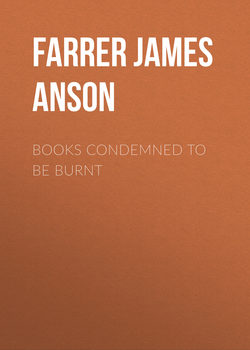Books Condemned to be Burnt

Реклама. ООО «ЛитРес», ИНН: 7719571260.
Оглавление
Farrer James Anson. Books Condemned to be Burnt
PREFACE
INTRODUCTION
CHAPTER I. Sixteenth Century Book-Fires
CHAPTER II. Book-Fires under James I
CHAPTER III. Charles the First's Book-Fires
CHAPTER IV. Book-Fires of the Rebellion
CHAPTER V. Book-Fires of the Restoration
CHAPTER VI. Book-Fires of the Revolution
CHAPTER VII. Our Last Book-Fires
APPENDIX
Отрывок из книги
THERE is the sort of attraction that belongs to all forbidden fruit in books which some public authority has condemned to the flames. And seeing that to collect something is a large part of the secret of human happiness, it occurred to me that a variety of the happiness that is sought in book collecting might be found in making a collection of books of this sort. I have, therefore, put together the following narrative of our burnt literature as some kind of aid to any book-lover who shall choose to take my hint and make the peculiarity I have indicated the key-note to the formation of his library.
But the aid I offer is confined to books so condemned in the United Kingdom. Those who would pursue the study farther afield, and extend their wishes beyond the four seas, will find all the aid they need or desire in Peignot's admirable Dictionnaire Critique, Littéraire, et Bibliographique des principaux Livres condamnés au feu, supprimés ou censurés: Paris, 1806. To have extended my studies to cover this wider ground would have swollen my book as well as my labour beyond the limits of my inclination. I may mention that Hart's Index Expurgatorius covers this wider ground for England, as far as it goes.
.....
A book at whose burning we may feel less surprise is the Théologie Portative ou Dictionnaire abrégéde la Religion Chrétienne, by the Abbé Bernier (1775), for a long time attributed to Voltaire, but really the work of an apostate monk, Dulaurent, who took refuge in Holland to write this and similar works.
The number of books of a similar strong anti-Catholic tendency that were burnt in these years before the outbreak of the Revolution should be noticed as helping to explain that event. Their titles in most cases may suffice to indicate their nature. De la Mettrie's L'homme Machine (1748) was written and burnt in Holland, its author being a doctor, of whom Voltaire said that he was a madman who only wrote when he was drunk. Of a similar kind was the Testament of Jean Meslier, published posthumously in the Evangile de la Raison, and condemned to the flames about 1765. On June 11th, 1763, the Parlement of Paris ordered to be burnt an anonymous poem, called La Religion à l'Assemblée du Clergé de France, in which the writer depicted in dark colours the morals of the French bishops of the time (1762). On January 29th, 1768, was treated in the same way the Histoire Impartiale des Jésuites of Linguet, whose Annales Politiques in 1779 conducted him to the Bastille, and who ultimately died at the hands of the Revolutionary Tribunal (1794). But the 18th of August, 1770, is memorable for having seen all the seven following books sentenced to burning by the Parlement of Paris: —
.....